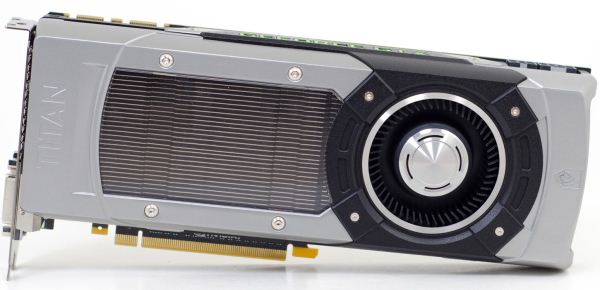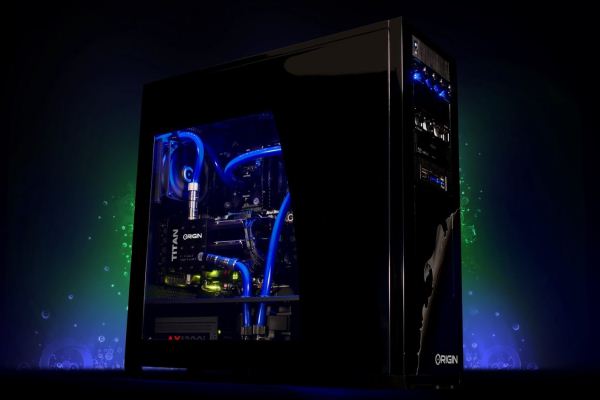NVIDIA’s GeForce GTX Titan Review, Part 2: Titan's Performance Unveiled
by Ryan Smith & Rahul Garg on February 21, 2013 9:00 AM ESTFinal Thoughts
Bringing things to a close, most of what we’ve seen with Titan has been a long time coming. Since the introduction of GK110 back at GTC 2012, we’ve had a solid idea of how NVIDIA’s grandest GPU would be configured, and it was mostly a question of when it would make its way to consumer hands, and at what clockspeeds and prices.
The end result is that with the largest Kepler GPU now in our hands, the performance situation closely resembles the Fermi and GT200 generations. Which is to say that so long as you have a solid foundation to work from, he who builds the biggest GPU builds the most powerful GPU. And at 551mm2, once more NVIDIA is alone in building massive GPUs.
No one should be surprised then when we proclaim that GeForce GTX Titan has unquestionably reclaimed the single-GPU performance crown for NVIDIA. It’s simply in a league of its own right now, reaching levels of performance no other single-GPU card can touch. At best, at its very best, AMD’s Radeon HD 7970GE can just match Titan, which is quite an accomplishment for AMD, but then at Titan’s best it’s nearly a generation ahead of the 7970GE. Like its predecessors, Titan delivers the kind of awe-inspiring performance we have come to expect from NVIDIA’s most powerful video cards.
With that in mind, as our benchmark data has shown, Titan’s performance isn’t quite enough to unseat this generation’s multi-GPU cards like the GTX 690 or Radeon HD 7990. But with that said this isn’t a new situation for us, and we find our editorial stance has not changed: we still suggest single-GPU cards over multi-GPU cards when performance allows for it. Multi-GPU technology itself is a great way to improve performance beyond what a single GPU can do, but as it’s always beholden to the need for profiles and the inherent drawbacks of AFR rendering, we don’t believe it’s desirable in situations such as Titan versus the GTX 690. The GTX 690 may be faster, but Titan is going to deliver a more consistent experience, just not quite at the same framerates as the GTX 690.
Meanwhile in the world of GPGPU computing Titan stands alone. Unfortunately we’re not able to run a complete cross-platform comparison due to Titan’s outstanding OpenCL issue, but from what we have been able to run Titan is not only flat-out powerful, but NVIDIA has seemingly delivered on their compute efficiency goals, giving us a Kepler family part capable of getting far closer to its theoretical efficiency than GTX 680, and closer than any other GPU before it. We’ll of course be taking a further look at Titan in comparison to other GPUs once the OpenCL situation is resolved in order to come to a better understanding of its relative strengths and weaknesses, but for the first wave of Titan buyers I’m not sure that’s going to matter. If you’re doing GPU computing, are invested in CUDA, and need a fast compute card, then Titan is the compute card CUDA developers and researchers have been dreaming of.
Back in the land of consumer gaming though, we have to contend with the fact that unlike any big-GPU card before it, Titan is purposely removed from the price/performance curve. NVIDIA has long wanted to ape Intel’s ability to have an extreme/luxury product at the very top end of the consumer product stack, and with Titan they’re going ahead with that.
The end result is that Titan is targeted at a different demographic than GTX 580 or other such cards, a demographic that has the means and the desire to purchase such a product. Being used to seeing the best video cards go for less we won’t call this a great development for the competitive landscape, but ultimately this is far from the first luxury level computer part, so there’s not much else to say other than that this is a product for a limited audience. But what that limited audience is getting is nothing short of an amazing card.
Like the GTX 690, NVIDIA has once again set the gold standard for GPU construction, this time for a single-GPU card. GTX 680 was a well-built card, but next to Titan it suddenly looks outdated. For example, despite Titan’s significantly higher TDP it’s no louder than the GTX 680, and the GTX 680 was already a quiet card. Next to price/performance the most important metric is noise, and by focusing on build quality NVIDIA has unquestionably set the new standard for high-end, high-TDP video cards.
On a final note, normally I’m not one for video card gimmicks, but after having seen both of NVIDIA’s Titan concept systems I have to say NVIDIA has taken an interesting route in justifying the luxury status of Titan. With the Radeon HD 7970 GHz Edition only available with open air or exotic cooling, Titan has been put into a position where it’s the ultimate blower card by a wide margin. The end result is that in scenarios where blowers are preferred and/or required, such as SFF PCs or tri-SLI, Titan is even more of an improvement over the competition than it is for traditional desktop computers. Or as Anand has so eloquently put it with his look at Falcon Northwest’s Tiki, when it comes to Titan “The days of a high end gaming rig being obnoxiously loud are thankfully over.”
Wrapping things up, on Monday we’ll be taking a look at the final piece of the puzzle: Origin’s tri-SLI full tower Genesis PC. The Genesis has been an interesting beast for its use of water cooling with Titan, and with the Titan launch behind us we can now focus on what it takes to feed 3 Titan video cards and why it’s an impeccable machine for multi-monitor/surround gaming. So until then, stay tuned.












337 Comments
View All Comments
CeriseCogburn - Tuesday, March 12, 2013 - link
ROFL another amd fanboy having a blowout. Mommie will be down to the basement with the bar of soap, don't wet your pants.When amd dies your drivers will still suck, badly.
trajan2448 - Saturday, March 16, 2013 - link
Until you guys start showing latencies, these reviews based primarily on fps numbers don't tell the whole story. Titan is 4x faster than multi GPU solutions in real rendering.IUU - Wednesday, March 20, 2013 - link
Just a thought: if they price titan say at 700 or 500 (that was the old price point for flagship cards), how on earth will they market game consoles, and the brave "new" world of the mobile "revolution"?Like it or not, high tech companies have found a convenient way to get away from the cutthroat competition of the pc-land(from there their hate and slogans like post-pc and the rest) and get a breath of fresh(money) air!
Whether this is also good for the consumer in the long run, remains to be seen, but the fact is, we will pay more to get less, unless something unexpected happens.
paul_59 - Saturday, June 15, 2013 - link
I would appreciate any intelligent opinions on the merits of buying a 690 card versus a Titan, considering they retail for the same pricebravegag - Tuesday, August 13, 2013 - link
I have bought the EVGA nVidia GTX Titan, actually two of them instead of the Tesla K20 thanks to the benchmark results posted in this article. However, the performance results I got are nowhere close to the ones shown here. Running DGEMM from CUDA 5.5 and CUBLAS example matrixMulCUBLAS with my EVGA nVidia GTX Titan reaches no more than 220 GFlop/s which is nowhere close to 1 TFlop/s. My question is then, are the results presented here a total fake?I created the following project where some additional HPC benchmarks of the nVidia GTX Titan are included, the benchmark computing environment is also detailed there:
https://github.com/bravegag/eigen-magma-benchmark
bravegag - Wednesday, August 14, 2013 - link
have anyone tried replicating the benchmark results shown here? how did it go?Tunnah - Wednesday, March 18, 2015 - link
It feels nVidia are just taking the pee out of us now. I was semi-miffed at the 970 controversy, I know for business reasons etc. it doesn't make sense to truly trounce the competition (and your own products) when you can instead hold something back and keep it tighter, and have something to release in case they surprise you.And I was semi-miffed when I heard it would be more like a 33% improvement over the current cream of the crop, instead of the closer to 50% increase the Titan was over the 680, because they have to worry about the 390x, and leave room for a Titan X White Y Grey SuperHappyTime version.
But to still charge $1000 even though they are keeping the DP performance low, this is just too far. The whole reasoning for the high price tag was you were getting a card that was not only a beast of a gaming card, but it would hold its own as a workstation card too, as long as you didn't need the full Quadro service. Now it is nothing more than a high end card, a halo product...that isn't actually that good!
When it comes down to it, you're paying 250% the cost for 33% more performance, and that is disgusting. Don't even bring RAM into it, it's not only super cheap and in no way a justification for the cost, but in fact is useless, because NO GAMER WILL EVER NEED THAT MUCH, IT WAS THE FLIM FLAMMING WORKSTATION CROWD WHO NEEDING THAT FLIM FLAMMING AMOUNT OF FLOOMING RAM YOU FLUPPERS!
This feels like a big juicy gob of spit in our faces. I know most people bought these purely for the gaming option and didn't use the DP capability, but that's not the point - it was WORTH the $999 price tag. This simply is not, not in the slightest. $650, $750 tops because it's the best, after all..but $999 ? Not in this lifetime.
I've not had an AMD card since way back in the days of ATi, I am well and truly part of the nVidia crowd, even when they had a better card I'd wait for the green team reply. But this is actually insulting to consumers.
I was never gonna buy one of these, I was waiting on the 980Ti for the 384bit bus and the bumps that come along with it...but now I'm not only hoping the 390x is better than people say because then nVidia will have to make it extra good..I'm hoping it's better than they say so I can actually buy it.
For shame nVidia, what you're doing with this card is unforgivable